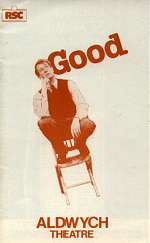
Production Information
Good in the USA Review from Daily News, 14.10.1982
Article / New York Sunday Magazine, 1982
Review: New York Post, 14.10.1982
|
|
Production Information Good in the USA Review from Daily News, 14.10.1982 Article / New York Sunday Magazine, 1982 Review: New York Post, 14.10.1982 |
|
Germany in the Thirties? Nothing, I should have thought, was harder to dramatise. Witness all those turgid films and telly-plays full of stuffed SS uniforms. But C.P. Taylor's Good at the Warehouse is an original and intelligent play, light in texture but serious in content, that tries to work out how decent, liberal, humane men came to be swept up by the Nazi juggernaut. It is billed as "a comedy with music", and its hero, a Frankfurt literature professor, is someone who tries to keep reality at bay through the tunes that swim through his head. But Taylor also shows how a blend of personal crises and moral inertia lead him inexorably towards Nazi commitment. |
|
He writes a pro-euthanasia novel and is snapped up by the party as an apologist for murder. He is an expert on Faust and Goethe and assumed to be an advocate of pure German Kultur. He abandons his messy, sluggish wife for a Rhine-maiden beauty who, like him, believes that private goodness can conquer public evil. In short, we see the steps that lead from a queasy acceptance of National Socialism to the very gates of Auswitchz itself.
What Taylor has done is to reclaim that cliche-figure, the good Nazi, and to show that is nonsense: that you cannot divorce the private conscience from the political activity, that you cannot be a soft liberal inside and a party member outside. But what gives the play its distinctive style and tone is the use of music as a metaphor for reality-evasion.
A cafe orchestra sits on stage along with the entire cast (a current RSC trademark) and strikes up the tunes that flit through the hero's head in moments of crisis: Bavarian mountain music when he dreams of flight with his mistress, Student Prince drinking songs as he surrenders to National Socialism, My Blue Heaven as an SS officer confesses his infertility. This is not the bad-taste joke (used by Peter Barnes in The Bewitched) of counterpointing savage acts with jaunty music. It becomes a direct way of expressing the self-kidding fantasies of a man who believes that, once the economy is sorted out, Nazism will go away.
|
The play combines instruction with delight (always harder than it sounds)). And Howard Davies's lean, spare, light production contains a peach of a performance from Alan Howard as the Frankfurt yea-sayer. It is good to be reminded, after all those Shakespearean kings, that he has the long, lean, worried face of a comic actor; yet the weak smiles, the blackbutton eyes behind silver glasses, the slight embarrassment about what to do with his body also convey perfectly Taylor's neurotic intellectual. Joe Melia as a Jewish chum and Felicity Dean as a Rheingold beauty lend strong support: and the evening makes a fascinating companion-piece to the Solzhenitsyn in showing that totalitarian tyranny can be evoked through glancing elegance as well as brutal realism. |
|
Michael Billington.
Guardian, 9.81.